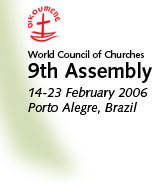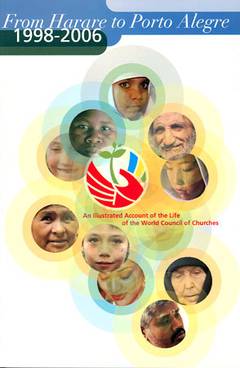 |
WCC > Home > News & media > News | ||||
| About the assembly | Programme | Theme & issues | News & media | |||||
 |
|
||||
|
11.11.05
Available online: The "Harare to Porto Alegre" report"From Harare to Porto Alegre" is the report of the World Council of Churches (WCC) central committee on activities and dialogue undertaken within the ecumenical fellowship between the WCC's eighth assembly in December 1998 on the campus of the University of Harare in Zimbabwe and the final stages of preparation for the ninth assembly at the Pontifical Catholic University in Porto Alegre, Brazil in February 2006. In telling the story of the World Council, it also reflects the life and faith of member churches, partner agencies and individual believers. Armenian Catholicos Aram I, moderator of the WCC central committee since 1991, writes, "We cannot transform the world unless we ourselves are transformed. What kind of church do we project for the 21st century? A church confined to nation-states or ethnic groups and exclusively concerned with its self-perpetuation; or a missionary church, open to the world and ready to face the challenges of the world?" The Rev. Dr Konrad Raiser, former general secretary, comments, "The future of the World Council of Churches lies in the way it allows for the éxpression of the widest possible diversity of opinion, and provides a protected space for encounter, in the resistance it offers to normative, exclusive and trenchant ways of thinking. The challenge for tomorrow's WCC is precisely in accompanying changes in mentalities, in generations and in forms of Christianity, and in facing up to the spiritual challenges that result." The Rev. Dr Samuel Kobia, current general secretary, said in reflecting on his first one hundred days in office; "The WCC's uniqueness lies in its special role as a global multilateral 'space' that brings together an extraordinary cross-section of histories, cultures and theologies to encounter each other in a way that no other organization does... The diversity that we have here should be seen not as an obstacle, but as a rich resource that needs to be put at the service of all." The World Council of Churches approaches its ninth assembly with a membership of 347 Christian churches representing the Orthodox, Anglican, Protestant, Pentecostal, African Instituted and uniting church traditions. The Roman Catholic Church is not a member of the WCC but works in cooperation with it.
|
|||
|
|
|


